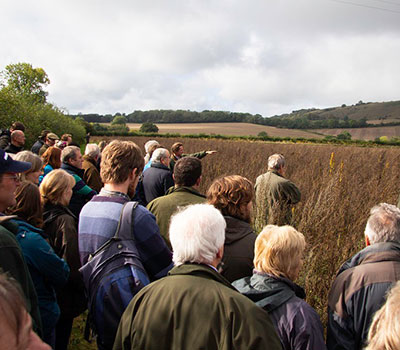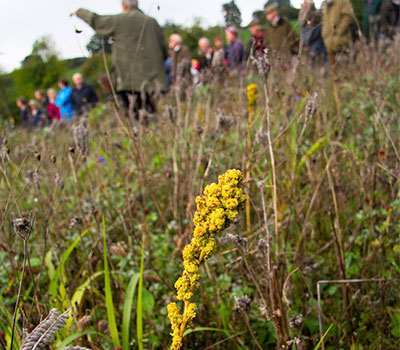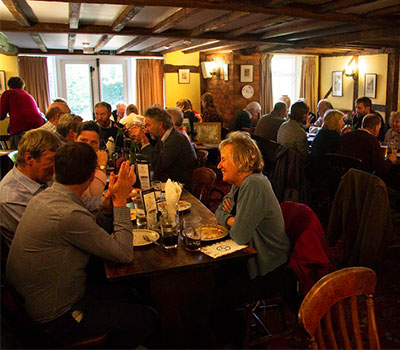East Wick Farm: championing the environment via sustainable land management
East Wick Farm in Wiltshire is run by David Butler and his family. The farm recently won the Barn Owl Award for the south west region in the Farming and Wildlife Advisory Group (FWAG).
The farm is a 720ha mixed farm with 35 acres of woodland. East Wick Farm is home to a colony of rare Duke of Burgundy Butterflies that Butterfly Conservation advise on. The farm provides diverse and rich habitats for many species due to its environment and the Butlers have taken measures to encourage even more wildlife into the area.
Here, David tells Farm Diversity editor Victoria Galligan about the farm’s journey from traditional farming to becoming an environmental beacon…
Could you tell us a little about East Wick Farm – where is it, what do you farm and how long have you been running the farm?
East Wick is a tenanted farm located in Pewsey Vale. We run this farm in combination with adjoining Lady Margaret Farm and together these are run as a traditional mixed farm with arable crops, beef cattle and a dairy unit. There are over 600 head of cattle in total. The soil types are varied and includes some chalk, some heavy clay but mostly greensand which is a fertile versatile soil type suited to a wide range of crops. The family have been on the farm since the 1930s when my Great Grandfather took on the tenancy.
You manage Martinsell Hill, an Iron Age Hillfort – does this bring visitors to the area?
Martinsell Hill is a very popular site for walkers and the car park is busy most days. The summit offers spectacular panoramic views and is the third highest point in Wiltshire. The chalk downland is home to many rare animal and plant species.
How did you become more sustainable as a farm and what impact did this have on the wildlife?
8% of the farmed area is dedicated to wildlife habitats. This includes varied wild bird covers, field corners, margins and bird plots. Over eight miles of new hedges have been planted over several years which have transformed the biodiversity indicators on the farm. We have regular professional surveys done to record the species found on the farm which includes many red-listed species.
Tell us about the school visits and “FaceTime the Farmer” – why is it so important to reach the younger generations?
Children are very enthusiastic about wildlife and farms in general and it is important to utilise this to develop a love for the countryside. Many children in urban environments suffer from rural disconnect so enabling them to see what happens on farms via new technology is helpful to dispel myths. If children can be encouraged to visit farms they understand better the origins of their food.
How have the FWAG helped your business?
FWAG have offered invaluable advice and guidance in past years to develop the natural landscape on the farm.
What is the Barn Owl Award and how did you come to be nominated?
This is the annual regional FWAG conservation award for the six counties of the SW. We had been encouraged to enter the competition by conservationists visiting the farm.
What impact has the award had on East Wick Farm?
We were hugely honoured to win the regional award and delighted to go on to be a runner up of the national award, The Silver Lapwing. We take it as a big responsibility to move forward with ambitious projects to enhance the biodiversity on the farm in novel ways.
What advice in terms of planning and funding do you have for farmers who want to make their farms more sustainable?
Get professional advice from organisations such as FWAG to determine the best steps forward for individual businesses. Look out for details of available grant schemes to help fund new projects.
FWAG members enjoy an environmental tour of East Wick Farm
On Tuesday 15th October, over 50 FWAG SouthWest members, advisers, partners, friends and neighbours gathered at Wootton Rivers Village Hall, Wiltshire, for a morning of celebrations.
Wiltshire Farmers, Richard and David Butler, of East Wick Farm, were presented with the FWAG SouthWest Barn Owl Award for conservation in 2018. They beat four finalists to win the coveted Farming and Wildlife Advisory Group South West’s regional competition, which celebrates those farmers that go the extra mile to produce food sustainably and carefully manage and conserve farmland wildlife.
Gary Rumbold, FWAG SouthWest General Manager, led the proceedings, marking FWAG’s 50th Anniversary. Gary spoke on this monumental landmark, noting 50 years of independent, expert advice to farmers from accredited, trained and experienced advisers who have nothing to sell but advice.
Gary highlighted why celebrating good farm environmental management is needed: “I believe it is very important to put a spotlight on farms like East Wick that are doing an amazing job at producing great food, running a profitable business and conserving our farmed environment. We need to shout about successes in farmland conservation and the Barn Owl Trophy is a perfect way to do that."
The event was generously sponsored by Bayer Crop Science. Julian Little, Head of Communications & Government Affairs UK, noted the importance of celebrating good farming practice, and outlined some of the merits of East Wick Farm, who Bayer have worked alongside.
Next to speak were hosts, Richard and David Butler, father and son. Both Richard and David are very hands-on at East Wick, running a commercially successful 720ha mixed farm, whilst simultaneously and conscientiously thinking to the future, with the natural flora and fauna at the forefront of their thinking. Simon Smart from the Pewsey Down’s Farmers Group (PDFG), of which the Butlers are members, gave an insight into the work the facilitation group are undertaking in the area. 
The guests were then ushered to the trailer, to begin the conservation tour. A lucky break in the rain saw the sun shining for us as we were guided from point to point. The Butlers, joined by Mark Smith, FWAG SouthWest Farm Conservation Adviser for the area, Ben Dolbear and David Bright of Bright Seeds, and Simon Smart (PDFG), took the opportunity to show guests various areas of the farm, discussing the seed mixes and options on the farm. We covered veteran trees, fauna poles, butterflies, hedgerows, field margins and corners, game cover, ponds and much more on the walk! An exceptional view of Martinsell Hill closed the walk, where guests returned to the pub for a hearty lunch.
Richard Butler of East Wick Farm said: “We are thrilled to have been awarded the Regional Barn Owl Trophy and it has been a pleasure to welcome so many guests to the farm today. This accolade has inspired further development on the farm such as the ponds and nest boxes – it’s been a huge incentive for us to continue our work on the farm, with conservation in mind”.
The celebrations rounded off with the drawing of the raffle prizes, kindly donated by Bright Seeds (wildflower mix), Digger and Mojo (voucher to spend in their antique shop), and additional prizes of a Friend of FWAG SW membership, local cider and apple juice and a copy of the book Wilding, by Isabella Tree.
The FWAG SW regional and county competitions will open again in January 2020. If you are a farmer that fancies your chances, or you know of a worthy farm that demonstrates good conservation practices alongside farming, use our online application to enter: fwagsw.org.uk
- Log in to post comments

